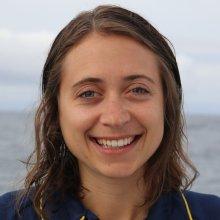
Sarah Seabrook
Tell us about your work/research. What kinds of things do you do?
What inspires me, scientifically, is how life not only survives but thrives, in conditions we once considered to be inhospitable. I study how microbes and animals live and interact in ecosystems fueled my chemosynthesis - a process where food is created by chemical reactions instead of sunlight. A large portion of my research is based in intriguing habitats known as methane seeps, where methane serves as the base of the food chain. These habitats are globally widespread, so studying them can take you all over the globe. Sometimes they are really deep, so remotely operated vehicles or submersibles must be used, and sometimes they are shallow enough SCUBA training can allow access. To investigate my scientific questions in these habitats, I use methods of microbiology, geochemical analysis, and traditional theories of ecology.
What sparked your initial interest in your career?
I've loved the oceans since I was a young kid on the beaches in Florida. I grew up searching for critters under the waves and wondering what existed deeper down. I eventually went on to study the oceans in my undergraduate. With this, I got experience ranging from oyster reefs in Tampa Bay, Florida to coral reefs in Indonesia and American Samoa. Through my studies, I started learning about the really unusual, 'weird' habitats like methane seeps and hydrothermal vents and I was hooked. I get so excited thinking about the different ways that animals are living in these habitats and by the similarities between these habitats and conditions present on other planetary bodies and early earth.
Who influenced you or encouraged you the most?
Other explorers have been so inspiring to me and motivated me a lot in my career. Particularly the early female explorers that really broke down a lot of those early barriers, paving paths for the rest of us. This includes Sally Ride, Isabella Bird, Jeanne Barr, and Valentina Tereshkova. I also am fortunate to meet many amazing adventurers, scientists, artists, and thinkers that all provide inspirations in their own way.
What element of your work/study do you think is the most fascinating?
I think it is totally amazing how little we know about our own oceans. We only know what is in less than 5% of our oceans.. we know more about space then we do our oceans! Every time that we go out on an expedition we always make new discoveries, and the full recognition of being the first humans to be setting eyes on a habitat we have just discovered is something I never tire of. I also find it so cool that you all get to join in with us to be the first humans to see these new habitats too!
What other jobs led you to your current career?
I've been fortunate to be able to dip my toes into many different sectors of marine science including internships with legislative programs, guest writing for student newspapers and blogs, assist with research projects in various locations around the world, and work with some great science communication groups. Working with all these different groups has helped me to think outside the box and always remember the importance of communicating cool discoveries and scientific findings.
What are your degrees and certifications?
Bachelor of Science, Marine Biology - University of South Florida 2015; Bachelor of Science, Environmental Science, and Policy - University of South Florida 2015; PADI Rescue Diver; AAUS Scientific Diver; Divers Alert Network First Aid and O2 provider
What are your hobbies?
I love trail running, scuba diving, biking, backpacking, skiing, and anything else that gets me outside. I also love to cook and have dinner parties with friends.
What advice would you give someone who wants to have a career like yours?
If oceanography, marine biology, or exploration is for you my advice is to never give up! It is a competitive and tough field, but the rewards are plenty and if you work hard enough you will find success. Take advantage of resources that are both around you and accessible via the web. Go to seminars, workshops, and conferences. Know that there are always things to be learned and every day seek to learn something new. Don't be afraid to ask questions (it is very true that the only bad question is the one that wasn't asked). Be confident in yourself and shoot for the stars (or the deepest depths of the ocean, in this case).
How did you get involved with the Nautilus Exploration Program? How did you get on the ship?
I first came on as a scientist in 2016 and have been coming back ever since as both a Science Manager and a Scientist.
Expeditions
Sarah participated in the following Ocean Exploration Trust expeditions:
